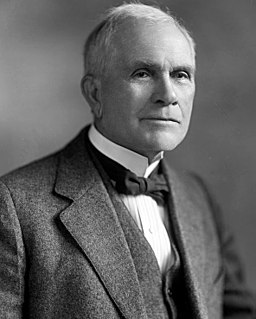
George Corley Wallace Jr. was the 45th Governor of Alabama, a position he occupied for four terms, during which he promoted "low-grade industrial development, low taxes, and trade schools". He sought the United States presidency as a Democrat three times, and once as an American Independent Party candidate, unsuccessfully each time. He is best remembered for his staunch segregationist and populist views. Wallace was known as "the most dangerous racist in America" and notoriously opposed desegregation and supported the policies of "Jim Crow" during the Civil Rights Movement, declaring in his 1963 inaugural address that he stood for "segregation now, segregation tomorrow, segregation forever".
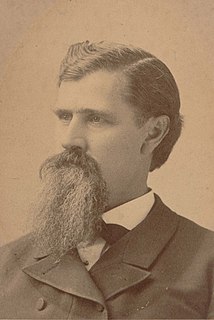
James Henderson Berry was a United States Senator and served as the 14th Governor of the State of Arkansas.

Lurleen Burns Wallace was the 46th Governor of Alabama for fifteen months from January 1967 until her death in May 1968. She was the first wife of Alabama Governor George Wallace, whom she succeeded as governor because the Alabama constitution forbade consecutive terms. She was Alabama's first female Governor and was the only female governor to hold the position until Kay Ivey became the second woman to succeed to the office in 2017. She is also the only female governor in U.S. history to have died in office. In 1973, she was posthumously inducted into the Alabama Women's Hall of Fame.
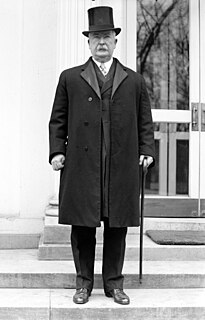
Emmet O'Neal was an American Democratic politician and lawyer who was the 34th Governor of Alabama from 1911 to 1915. He was a reformer in the progressive mold, and is best known for securing the commission form of government for the cities of Alabama.
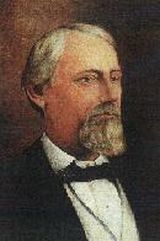
Rufus Willis Cobb was an American Democratic politician who was the 25th Governor of Alabama from 1878 to 1882.

William Wyatt Bibb was a United States Senator from Georgia and the first Governor of the U.S. state of Alabama. Bibb County, Alabama, and Bibb County, Georgia, are named for him.
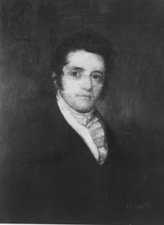
Gabriel Moore was a Democratic-Republican politician and fifth Governor of the U.S. state of Alabama (1829–1831).

The Supreme Court of Alabama is the highest court in the state of Alabama. The court consists of a Chief Justice and eight Associate Justices. Each justice is elected in partisan elections for staggered six-year terms. The Supreme Court is housed in the Heflin-Torbert Judicial Building in downtown Montgomery, Alabama.
The Alabama Public Service Commission, commonly called the PSC, was established by an act of the Alabama Legislature in 1915 to primarily replace the State Railroad Commission. The PSC's responsibility was expanded in 1920 to include regulating and setting rates that utility companies charge their customers for electricity. The legislature expanded the PSC's responsibilities in later years to include those companies that provide gas, water, and communications, as well as transportation common carriers such as trucking and air carriers. The PSC effectively determines the rate of profits that most of these companies are allowed to earn. However, some of its traditional responsibilities have passed to the federal government with the passage of the Federal Aviation Act of 1994 and the Federal Communications Act of 1996.
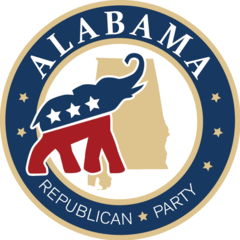
The Alabama Republican Party is the state affiliate of the Republican Party in Alabama. It is the dominant political party in Alabama. The state party is governed by the Alabama Republican Executive Committee. The committee usually meets twice a year. As of the February 23, 2019 meeting in Birmingham, the committee is composed of 463 members, it is likely one of the largest executive committee in the nation. Most of the committee's members are elected in district elections across Alabama. The district members are elected in the Republican Primary once every four years, with the most recent election for the committee having been on June 5, 2018. The new committee assumed office following the general election in November 2018. In addition, all 67 county GOP chairmen have automatic seats as voting members. The state chairman can appoint 10 members. Each county committee can appoint bonus members based on a formula that theoretically could add 312 seats, although that formula currently calls for only about 100 seats.
Stephen Ralph Windom is an American attorney, politician and member of the Republican Party who served as member of the Alabama State Senate from 1989 to 1998 and as the 27th Lieutenant Governor of Alabama from 1999 to 2003.

Kay Ellen Ivey is an American politician serving as the 54th Governor of Alabama since 2017. A member of the Republican Party, she previously was the 38th Alabama State Treasurer from 2003 to 2011 and 30th Lieutenant Governor of Alabama from 2011 to 2017. Ivey became Alabama's second female governor and first female Republican governor upon the resignation of her predecessor, Robert J. Bentley. She won a full term in the 2018 gubernatorial election.

Elections were held in Alabama on Tuesday, November 2, 2010. Primary elections were held on June 1, 2010 with the run-off on July 13.

The 1902 Alabama gubernatorial election took place on November 2, 1902, in order to elect the Governor of Alabama. It was the first Alabama gubernatorial election in which the governor was elected for a four-year term; prior to 1902 the governor was elected to a two-year term. Incumbent Democrat William D. Jelks was running for election to his first full term; he had succeeded William J. Samford upon Samford's death a year prior. His Republican opponent, John A. W. Smith, was the son of former Alabama governor William Hugh Smith.

A general election was held in the U.S. state of Alabama on November 6, 2018. All Alabama executive officers were up for election along with all of Alabama's seven seats in the United States House of Representatives. Primary elections took place on June 5, 2018, for both major parties.

The 1859 Alabama gubernatorial election took place on August 1, 1859 in order to elect the Governor of Alabama. Democrat Andrew Moore won his second term as Governor.

The 1857 Alabama gubernatorial election took place on August 3, 1857 in order to elect the Governor of Alabama. Democrat Andrew Moore won his first term as Governor. John A. Winston did not run because he was term-limited.

